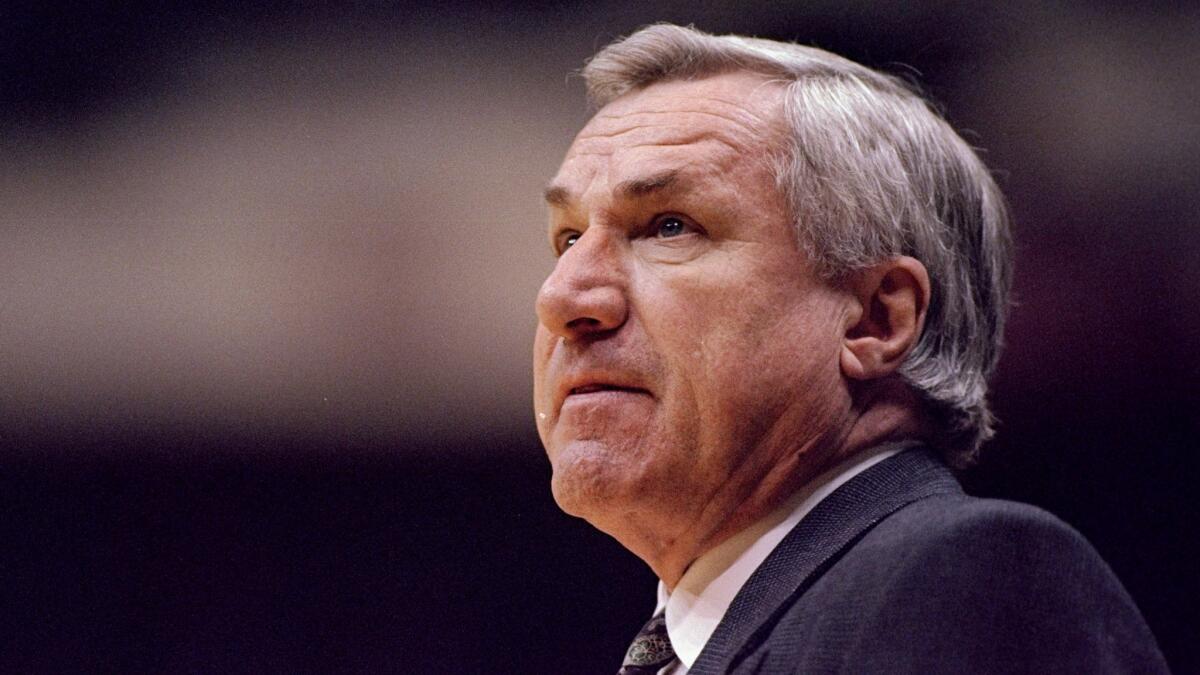Column: Growing up to appreciate Dean Smith’s greatness

- Share via
As I was raised in Southern California during the mesmerizing vortex of UCLA’s basketball dynasty, my tight-knit coaching world was divided into two categories.
There was John Wooden and everyone else.
And the rest, including Dean Smith, were like the supporting cast on “Gilligan’s Island.”
Dave Meyers, the star of Wooden’s last NCAA title team in 1975, came to UCLA from La Habra Sonora High, my school.
Ever have a guy make it big from your town?
His little sister, Ann, who could also play a little round ball, was one of my high school classmates.
Dean Smith, to the adolescent me, was the coach who couldn’t win the big one. Worse, he ran the “Four Corners” offense, an abomination of James Naismith’s glorious game in which North Carolina won games by trying not to score.
I was thrilled it so miserably failed in 1968, when UCLA defeated North Carolina to win the NCAA championship.
I realize now that North Carolina didn’t lose because of the Four Corners. It lost because UCLA had Lew Alcindor.
Still, the stall game was anathema to every fiber in my “Pistol” Pete Maravich mind-set, and a direct affront to UCLA’s full-court press and free-flow basketball style.
The stall, later perfected by keep-away guard Phil Ford, was anti-basketball. Thank goodness for the advent, in 1982, of the shot clock.
My feelings for the Four Corners have never wavered — still hate it — but my appreciation for Smith has turned a big, roundhouse corner.
I was lucky, as the national college basketball reporter for this news organization, to cover two important games in Smith’s career: when he tied and then surpassed Kentucky Coach Adolph Rupp’s major college victories record of 876.
Smith tied the mark in the 1997 NCAA tournament, at a sub-regional in Winston-Salem, N.C., with a win over Fairfield. Smith surpassed Rupp in a sub-regional final win against Colorado.
I admired Smith for the way he handled the buildup to Rupp — mostly for how much he genuinely despised it.
“I’m not going to talk about anything other than this team trying to win its 25th game of the season Thursday night,” Smith said that week. “I’ve never been into coaching records anyway.”
Some coaches say those things. Smith meant it.
He taught that life was about “thousands of small, unselfish acts.”
North Carolina struggled to defeat unsung Fairfield, and Smith was beyond gracious. That same night, in the same arena, after Indiana lost to Colorado, Hoosiers Coach Bob Knight stormed out of the building and walked several miles back to the team hotel.
It was an interesting juxtaposition of two legendary coaches.
After Smith surpassed Rupp for the wins mark — which has since been surpassed by Mike Krzyzewski, Jim Boeheim and Knight — a writer working in the media room asked out loud whether it was fair to say Smith was now the greatest coach of all time.
The teenager in me mentioned that there once was a coach named Wooden. But I started then to appreciate how important it was that Smith was the man to overtake Rupp, whose record on civil rights was less than stellar.
They say records are meant to be broken. That record needed to be broken by Dean Smith.
Born in Kansas, he refused to accept the South for the way it was. In 1958, he walked into a Chapel Hill restaurant with a black man to challenge the restaurant’s segregation policies.
“Doing what’s right isn’t something to brag about,” he later said.
Smith tried signing North Carolina’s first black player in 1961, and finally succeeded in 1966, with Charlie Scott.
Eighteen former players, including George Karl, Sam Perkins, Bobby Jones and Mitch Kupchak, were in attendance the night Smith broke Rupp’s record.
Smith was genuinely moved, saying, “I don’t know how they got tickets.”
He retired the following October, in 1997, and settled into a legacy retirement.
When it was revealed a few years ago that Smith’s health was failing, I was asked to start researching and writing his advance obituary. It is a somewhat morbid but necessary practice in journalism — to have an article ready on an important person when death does come.
I spent days reading accounts of Smith’s extraordinary life and career. My admiration grew with each turned page of his memoir, “A Coach’s Life,” with John Kilgo and Sally Jenkins.
I had matured from a young man who, for petulant reasons, didn’t care much for Smith, to a grown man who could finally grasp the totality of his greatness.
Smith was a man of humility and uncommon decency.
He did finally win the “big one” too, earning two NCAA titles before his retirement.
You must win championships to earn your place in history, but greatness had to be more than the empirical, final scorecard of my uninitiated youth: Wooden 10 titles, Smith two.
As a man, mentor, and teacher, Smith certainly deserves a seat in Wooden’s pantheon. Both taught lessons beyond basketball.
Knowing how to properly tie your sneakers is important, but not as important as how you treat others.
In his memoir, Smith recounted that his father told him to “value each human being.”
Dean Smith made the basketball world, and his father, proud. Not only by the big things he accomplished, but by the thousands of little, unselfish things.
Wooden and Smith both have a Pied Piper following of devoted former players who carry on the lessons they learned.
Wooden had his way and Smith had “The Carolina Way.”
There are other ways, certainly, and while no life of a mortal man is perfect, those are two pretty good paths to follow.
Twitter: @DufresneLATimes
More to Read
Go beyond the scoreboard
Get the latest on L.A.'s teams in the daily Sports Report newsletter.
You may occasionally receive promotional content from the Los Angeles Times.











